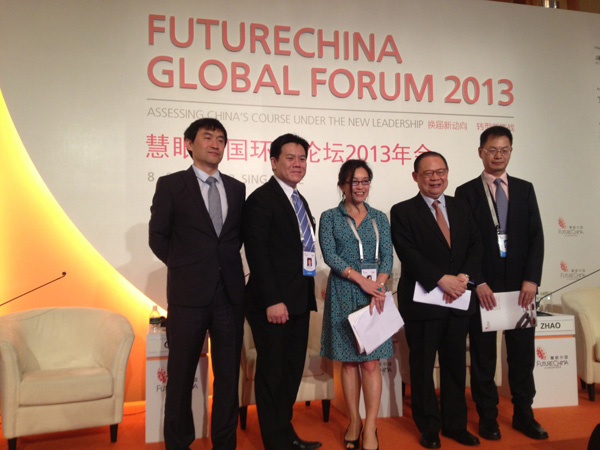Chinese Stock Markets find themselves 60% below their 2007 peak values and with little progress in addressing regulatory and transparency issues so far. Bringing them back to vitality and sound business poses a significant policy challenge to the new Chinese leadership.
CKGSB Associate Dean and Professor of Finance, Chen Long, offered his assessment and suggestions on the topic at the FutureChina Global Forum 2013, themed “Assessing China’s Course under the New Leadership”, in a panel entitled “What could make China financial markets take off at long last?”
 Since last year Beijing has started showing commitment to market reforms by improving the IPO issuing system and through increasing foreign investor access to the stock markets. However, further issues need to be considered in order to assess future challenges. On the one hand there is need to identify current and long-term policy priorities, while on the other there is need to weight the extent of reform commitment by the Chinese government.
Since last year Beijing has started showing commitment to market reforms by improving the IPO issuing system and through increasing foreign investor access to the stock markets. However, further issues need to be considered in order to assess future challenges. On the one hand there is need to identify current and long-term policy priorities, while on the other there is need to weight the extent of reform commitment by the Chinese government.
Professor Chen explained that with few companies undertaking IPOs due to the government‘s control and influence over supply and demand, prices in the financial markets remain generally high. Investors on the other hand do not have the necessary trust in the market to keep it dynamic, making the Chinese stock markets lose out in investment and growth potential.
He suggests that rather than influencing supply and demand, Beijing “should allow companies to list/delist easily within the rules and enhance transparency”. More specifically there is need to set-up the necessary rules and regulations to make the market more mature, so to give investors the necessary confidence to come back. At the same time there is the need to “improve the efficiency of asset allocations through the financial market itself”
So far such reforms have not been effectively implemented, argues Professor Chen, as the Chinese government “does not systematically understand the financial market”. Zhao Xijun, Deputy Director of the Finance and Securities Institute, also points out to the inexperience of the Chinese investors, many of whom are over 50 and do not have familiarity with the stock market. In fact, he argues, the stock market so far has been helping to familiarize and educate Chinese investors on financial perspectives and theories.
Victor Chu –Chairman of First Eastern Investment Group–, outlined current risks due to historical reasons. First of all, as companies are selected by a quota system and not by the market itself, some questionable ones remain on the scene. Second, as the stock market was set-up as an experiment, the resulting regulations and roles of the major share-holders and managers make the achievement of “good equilibrium and transparency” difficult. To address such issues, he suggests cross-listings with the Hong Kong Stock exchange, in a greater China financial market, so to provide Chinese investors with more choice and provide sufficient transaction volume. Listed companies would in this case benefit from a higher share of liquidity. However, he points out, it is still unlikely that high quality competition will be allowed to outcompete the more questionable companies in the market.
The Executive Vice-President of Singapore Exchange Ltd., Chew Sutat, stressed upon the importance of trust and credibility. With better governance and transparency, the idea of cross-listing would be highly beneficial to the market and improve trust and credibility in it. Today Chinese companies still need to raise equity capital in order to support themselves. However with 20% of transactions done in RMB today, and rising contribution of China to the world economy, the internationalization of the RMB would also become a crucial aspect to take into account for the development of the financial market.

From left to right, Chen, Chew, Lee, Chu and Zhao. FutureChina 2013.